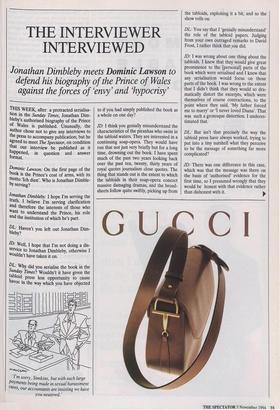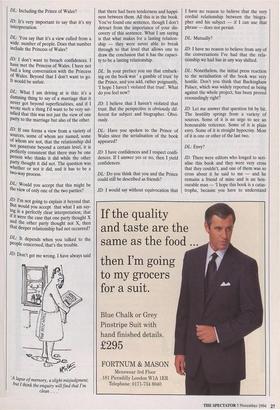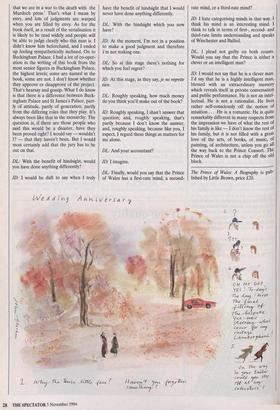THE INTERVIEWER INTERVIEWED
Jonathan Dimbleby meets Dominic Lawson to
defend his biography of the Prince of Wales against the forces of 'envy' and 'hypocrisy'
THIS WEEK, after a protracted serialisa- tion in the Sunday Times, Jonathan Dim-
bleby's authorised biography of the Prince of Wales is published. Unusually, the author chose not to give any interviews to
the press to accompany publication; but he agreed to meet The Spectator, on condition that our interview be published as it
happened, in question and answer format.
Dominic Lawson: On the first page of the book is the Prince's coat of arms, with its
motto `Ich dien'. Who is Jonathan Dimble- by serving?
Jonathan Dimbleby: I hope I'm serving the truth. I believe I'm serving clarification and therefore the interests of those who want to understand the Prince, his role and the institution of which he's part.
DL: Haven't you left out Jonathan Dim- bleby?
ID: Well, I hope that I'm not doing a dis- service to Jonathan Dimbleby, otherwise I
wouldn't have taken it on.
DL: Why did you serialise the book in the Sunday Times? Wouldn't it have given the
tabloid press less opportunity to cause havoc in the way which you have objected `I'm sorry, Simkins, but with such large payments being made in sexual harassment Cases, our accountants are insisting we have you neutered.' to if you had simply published the book as a whole on one day?
JD: I think you genially misunderstand the characteristics of the piranhas who swim in the tabloid waters. They are interested in a continuing soap-opera. They would have run that not just very briefly but for a long time, drowning out the book. I have spent much of the past two years looking back over the past ten, twenty, thirty years of royal quotes journalism close quotes. The thing that stands out is the extent to which the tabloids in their soap-opera concoct massive damaging dramas, and the broad- sheets follow quite swiftly, picking up from
the tabloids, exploiting it a bit, and so the show rolls on.
DL: You say that I 'genially misunderstand' the role of the tabloid papers. Judging from your own outraged remarks to David Frost, I rather think that you did.
JD: I was wrong about one thing about the tabloids. I knew that they would give great prominence to the [personal] parts of the book which were serialised and I knew that any serialisation would focus on those parts of the book. I was wrong to the extent that I didn't think that they would so dra- matically distort the excerpts, which were themselves of course contractions, to the point where they said, 'My father forced me to marry' or 'I never loved Diana'. That was such a grotesque distortion. I underes- timated that.
DL: But isn't that precisely the way the tabloid press have always worked, trying to put into a tiny nutshell what they perceive to be the message of something far more complicated?
JD: There was one difference in this case, which was that the message was there on the basis of 'authorised' evidence for the first time, so I presumed wrongly that they would be honest with that evidence rather than dishonest with it. DL: The allegation which appears to upset you is that they say you say the Prince of Wales never loved the Princess, and clearly that is something which has been alleged by many writers, and not just in the tabloid press. I looked for something in the book which might prove them right, and I refer you to page 397 in which you wrote of the Prince and Princess being 'trapped in a relationship which had never penetrated beyond the everyday superficialities of their shared existence'. To me, that is, in your own elegant prose style, precisely the same allegation to which you now object.
JD: I think that is a misunderstanding of what is in the book. You can have feelings, you can want to penetrate beyond the everyday. You can seek to do that. But, in a relationship which is for all manner of reasons very fraught and very difficult and under great pressure, you can fail to do so but still love.
DL: But it says 'never penetrated beyond everyday superficialities', a relationship which has never, never penetrated beyond the superficialities of everyday life. I would say that that is a description of a marriage which never had true love.
JD: I would say that it is a good description of a marriage in which there was an incom- patibility, a marriage where there could be a lot of concern and a lot of feeling and tenderness, but a failure to construct the lasting relationship which we think of as true love.
DL: Is that what you have learned from the Prince of Wales?
JD: The view is culled from a wide range of sources. DL: Including the Prince of Wales?
JD: It's very important to say that it's my interpretation.
DL: You say that it's a view culled from a wide number of people. Does that number include the Princess of Wales?
JD: I don't want to breach confidences. I have met the Princess of Wales. I have not had a long conversation with the Princess of Wales. Beyond that I don't want to go. It would be unfair.
DL: What I am driving at is this: it's a damning thing to say of a marriage that it never got beyond superficialities, and if I wrote such a thing I'd want to be very sat- isfied that this was not just the view of one Party to the marriage but also of the other.
JD: If one forms a view from a variety of sources, some of whom are named, some of whom are not that the relationship did not penetrate beyond a certain level, it is perfectly consistent that there may be one person who thinks it did while the other party thought it did not. The question was whether or not it did, and it has to be a two-way process.
DL: Would you accept that this might be the view of only one of the two parties?
ID: I'm not going to explain it beyond that. But would you accept that what I am say- ing is a perfectly clear interpretation; that if it were the case that one party thought X and the other party thought not X, then that deeper relationship had not occurred?
DL: It depends when you talked to the people concerned, that's the trouble.
ID: Don't get me wrong. I have always said lapse of memory, a slight misjudgment, but I think the enquiry will find that I'm clean . . that there had been tenderness and happi- ness between them. All this is in the book. You've found one sentence, though I don't detract from the importance of your dis- covery of this sentence. What I am saying is that what makes for a lasting relation- ship — they were never able to break through to that level that allows one to draw the conclusion that it has the capaci- ty to be a lasting relationship.
DL: In your preface you say that embark- ing on the book was ' a gamble of trust' by the Prince, and you add, rather poignantly, `I hope I haven't violated that trust'. What do you feel now?
JD: I believe that I haven't violated that trust. But the perspective is obviously dif- ferent for subject and biographer. Obvi- ously.
DL: Have you spoken to the Prince of Wales since the serialisation of the book appeared?
JD: I have confidences and I respect confi- dences. If I answer yes or no, then I yield confidences.
DL: Do you think that you and the Prince could still be described as friends?
JD: I would say without equivocation that I have no reason to believe that the very cordial relationship between the biogra- pher and his subject — if I can use that phrase — does not persist.
DL: Mutually?
JD: I have no reason to believe from any of the conversations I've had that the rela- tionship we had has in any way shifted.
DL: Nonetheless, the initial press reaction to the serialisation of the book was very hostile. Don't you think that Buckingham Palace, which was widely reported as being against the whole project, has been proved resoundingly right?
JD: Let me answer that question bit by bit. The hostility springs from a variety of sources. Some of it is an urge to see an honourable reticence. Some of it is plain envy. Some of it is straight hypocrisy. Most of it is one or other of the last two.
DL: Envy?
JD: There were editors who longed to seri- alise this book and they were very cross that they couldn't, and one of them was so cross about it he said to me — and he remains a friend of mine and is an hon- ourable man — 'I hope this book is a catas- trophe, because you have to understand that we are in a war to the death with the Murdoch press.' That's what I mean by envy, and lots of judgments are warped when you are filled by envy. As for the book itself, as a result of the serialisation it is likely to be read widely and people will be able to judge clearly who this man is. I didn't know him beforehand, and I ended up feeling sympathetically inclined. On to Buckingham Palace: I had a lot of co-oper- ation in the writing of this book from the most senior figures in Buckingham Palace, the highest levels; some are named in the book, some are not. I don't know whether they approve or disapprove of the project. That's hearsay and gossip. What I do know is that there is a difference between Buck- ingham Palace and St James's Palace, part- ly of attitude, partly of generation, partly from the differing roles that they play. It's always been like that in the monarchy. The question is, if there are those people who said this would be a disaster, have they been proved right? I would say — wouldn't I? — that they haven't been. But I would most certainly add that the jury has to be out on that.
DL: With the benefit of hindsight, would you have done anything differently?
ID: I would be daft to say when I truly have the benefit of hindsight that I would never have done anything differently.
DL: With the hindsight which you now have?
JD: At the moment, I'm not in a position to make a good judgment and therefore I'm not making one.
DL: So at this stage there's nothing for which you feel regret?
JD: At this stage, as they say, je ne regrette rien.
DL: Roughly speaking, how much money do you think you'll make out of the book?
JD: Roughly speaking, I shan't answer that question; and, roughly speaking, that's partly because I don't know the answer; and, roughly speaking, because like you, I expect, I regard these things as matters for me alone.
DL: And your accountant? JD: I imagine.
DL: Finally, would you say that the Prince of Wales has a first-rate 'mind, a second- rate mind, or a third-rate mind?
JD: I hate categorising minds in that way. I think his mind is an interesting mind. I think to talk in terms of first-, second- and third-rate limits understanding and speaks of Winchester and Balliol.
DL: I plead not guilty on both counts. Would you say that the Prince is either a clever or an intelligent man?
JD: I would not say that he is a clever man. I'd say that he is a highly intelligent man, blessed with an extraordinary memory which reveals itself in private conversation and public performance. He is not an intel- lectual. He is not a rationalist. He lives rather self-consciously off the notion of intuition ... He is a romantic. He is quite remarkably different in many respects from the impression we have of what the rest of his family is like — I don't know the rest of his family, but it is not filled with a great love of the arts, of books, of music, of painting, of architecture, unless you go all the way back to the Prince Consort. The Prince of Wales is not a chip off the old block.
The Prince of Wales: A Biography is pub- lished by Little Brown, price £20.













































































 Previous page
Previous page